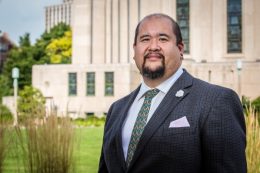David G. Embrick
Associate Professor
Sociology and Africana Studies
Education/Professional Certification
PhD, 2006, Sociology, Texas A&M University
MA, 2002, Sociology, Texas A&M University
BA, 1999, Sociology, Texas A&M University
Expertise
Inequality, race and education, racial microaggressions, the impact of schools-welfare-and prisons on people of color, sex discrimination
Biography
Dr. David G. Embrick holds a joint position as Associate Professor in the Sociology Department and African Studies Institute at the University of Connecticut. Prior to UConn, he spent a decade at Loyola University Chicago as faculty in the Sociology Department. He received his Ph.D. from Texas A&M University in 2006. He is a former American Sociological Association Minority Fellow; Past-President of the Southwestern Sociological Association; current Vice President of the Society for the Study of Social Problems; and current President of the Association for Humanist Sociology. In addition, Dr. Embrick serves as the Founding Co-Editor of Sociology of Race and Ethnicity; Founding Book Series Editor of Sociology of Diversity, with Bristol University Press; and Founding Book Series Co-Editor of Sociology of Race and Ethnicity, with Georgia University Press.
Dr. Embrick’s research has centered largely on the impact of contemporary forms of racism on people of color. While most of his research is one what he has labeled “diversity ideology” and inequalities in the business world, he has published on race and education, racial microaggressions, the impact of schools-welfare-and prisons on people of color, and issues of sex discrimination. Dr. Embrick has published in a number of journals including American Behavioral Scientist, Critical Sociology, Race and Society, Sex Roles, Social Problems, Sociological Forum, and Symbolic Interaction, among others. He has been invited to give talks and workshops on diversity; racism in the workplace; racism and space; racial microaggressions; and various issues of academic professionalism in over 125 venues, both academic and public.
